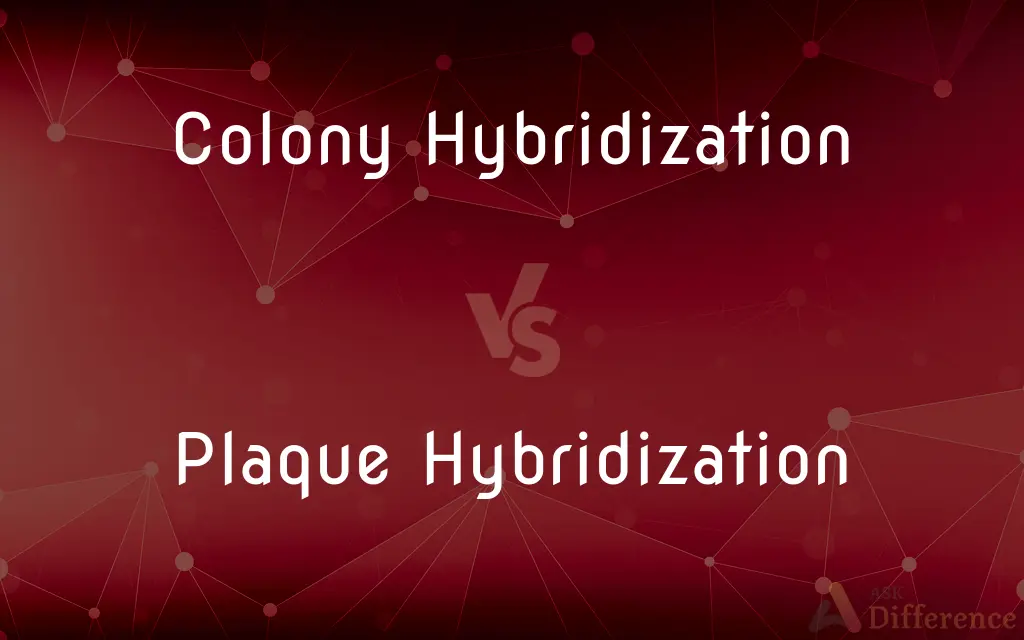Colony Hybridization vs. Plaque Hybridization — What's the Difference?
By Tayyaba Rehman — Published on December 14, 2023
Colony Hybridization detects specific DNA in bacterial colonies, while Plaque Hybridization identifies DNA within bacteriophage plaques.

Difference Between Colony Hybridization and Plaque Hybridization
Table of Contents
ADVERTISEMENT
Key Differences
Colony Hybridization and Plaque Hybridization are molecular biology techniques designed to identify specific DNA sequences of interest within distinct growth formations. These methods provide insights into gene presence and expression.
Colony Hybridization specifically targets bacterial colonies. In this process, a filter is applied onto a bacterial plate, which then binds with the DNA from bacterial colonies. Post DNA denaturation, this filter is probed with a specific labeled DNA sequence. If the sequence is present within a colony, a signal is produced, revealing its location. Conversely, Plaque Hybridization focuses on bacteriophage plaques, which are clear zones formed on bacterial lawns due to viral infection and subsequent bacterial lysis.
The main concept behind Colony Hybridization is to identify bacteria that have a specific gene of interest. This is essential in recombinant DNA technology where scientists aim to find bacterial colonies that have taken up the desired gene. In contrast, Plaque Hybridization is used to identify bacteriophages carrying specific DNA sequences. This method is instrumental in phage library screenings to locate desired DNA fragments.
While both techniques are rooted in the principle of DNA hybridization and utilize labeled probes to detect target sequences, Colony Hybridization is predominantly used in bacterial studies and gene cloning. In contrast, Plaque Hybridization is the method of choice for phage genetics and molecular studies related to bacteriophages.
In summary, while both Colony Hybridization and Plaque Hybridization aim to identify specific DNA sequences within growth formations, the former is tailored for bacterial colonies and the latter for bacteriophage plaques.
ADVERTISEMENT
Comparison Chart
Target Organisms
Bacteria
Bacteriophages
Formation Studied
Bacterial colonies
Bacteriophage plaques
Main Application
Recombinant DNA technology, gene cloning
Phage library screenings, phage genetics
Visible Result
Signal on bacterial colony with target DNA
Signal on bacteriophage plaque with target DNA
Principle
DNA hybridization in bacterial colonies
DNA hybridization in bacteriophage plaques
Compare with Definitions
Colony Hybridization
Relies on DNA-DNA hybridization in bacterial context.
By leveraging Colony Hybridization, researchers distinguished between wild-type and mutant bacterial strains.
Plaque Hybridization
Essential in bacteriophage genetics studies.
Plaque Hybridization is a cornerstone technique in studying phage DNA.
Colony Hybridization
Method to probe bacterial colonies with labeled DNA.
Through Colony Hybridization, scientists detected colonies with antibiotic resistance genes.
Plaque Hybridization
Technique to detect DNA within bacteriophage plaques.
Plaque Hybridization identified phages with the desired gene fragment.
Colony Hybridization
Assists in finding bacteria with desired genes.
Colony Hybridization helps pinpoint colonies with recombinant plasmids.
Plaque Hybridization
Relies on DNA-DNA hybridization in phage context.
Researchers utilized Plaque Hybridization to discern between different phage types.
Colony Hybridization
Essential for gene cloning processes.
Successful Colony Hybridization ensured the right gene was cloned.
Plaque Hybridization
Probing method for specific sequences in phage libraries.
Scientists used Plaque Hybridization to screen a lambda phage library.
Colony Hybridization
Technique to locate specific DNA in bacterial colonies.
Colony Hybridization was used to identify E. coli colonies carrying the insulin gene.
Plaque Hybridization
Determines phages carrying specific DNA pieces.
With Plaque Hybridization, phages containing genes of interest were isolated.
Common Curiosities
Which organisms are the focus in Plaque Hybridization?
Bacteriophages are the main organisms of interest.
What is Colony Hybridization?
It's a technique to detect specific DNA sequences within bacterial colonies.
Where is Colony Hybridization commonly used?
It's widely used in recombinant DNA technology and gene cloning processes.
How do both techniques produce visible results?
Both use labeled DNA probes; when these probes bind to target DNA, a detectable signal is generated.
Is Colony Hybridization related to antibiotic resistance?
It can be used to detect bacterial colonies that carry antibiotic resistance genes.
How does Plaque Hybridization differ?
Plaque Hybridization identifies DNA within clear zones, or plaques, formed by bacteriophages on bacterial lawns.
Why are plaques significant in Plaque Hybridization?
Plaques result from bacteriophage infection and lysis, and they contain specific phage DNA.
Are there alternative methods to Colony Hybridization?
Yes, PCR and sequencing can also detect specific genes in bacteria.
Which method is older, Colony or Plaque Hybridization?
Both emerged around the same time with advances in molecular biology.
Is Plaque Hybridization limited to specific bacteriophages?
No, it can be used for any bacteriophage that forms plaques on bacterial lawns.
Can Colony Hybridization be used for viruses?
No, Colony Hybridization is specific to bacterial colonies.
Can these methods detect RNA sequences?
In principle, if converted to complementary DNA (cDNA), but they're primarily designed for DNA.
How is Plaque Hybridization useful in molecular biology?
It aids in screening phage libraries and studying bacteriophage genetics.
What’s the core principle behind both techniques?
DNA hybridization, where labeled probes bind to complementary DNA sequences.
How reliable are these techniques?
Both are highly reliable when conducted correctly, with appropriate controls.
Share Your Discovery

Previous Comparison
Nucleic Acid vs. Amino Acid
Next Comparison
Open Syllable vs. Closed SyllableAuthor Spotlight
Written by
Tayyaba RehmanTayyaba Rehman is a distinguished writer, currently serving as a primary contributor to askdifference.com. As a researcher in semantics and etymology, Tayyaba's passion for the complexity of languages and their distinctions has found a perfect home on the platform. Tayyaba delves into the intricacies of language, distinguishing between commonly confused words and phrases, thereby providing clarity for readers worldwide.












































